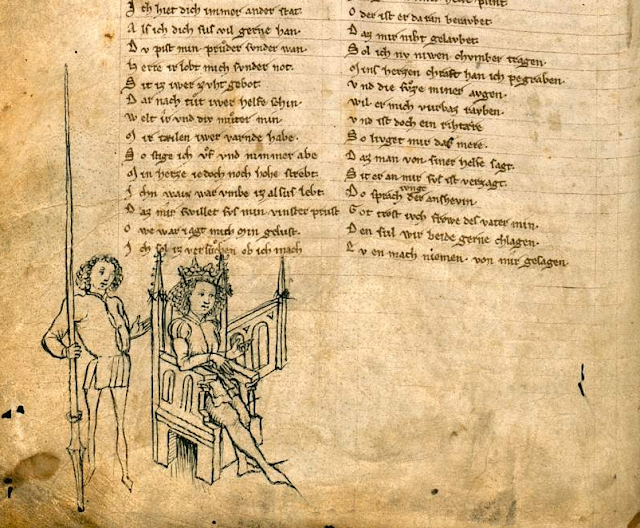 |
| The adventures of Siegfried. |
Next: Wolfram von Eschenbach's Parzival, for triple Wagner-opera points.
I presume that it's hardly surprising to you, Gentle Readers, to learn that Wagner was selective with his sources, and adventurous in their transformation. But I feel it's especially worth mentioning in the case of Parsifal / Parzifal. While Wagner's work almost shares a name with Wolfram von Eschenbach's, it's a work which layers symbolic vocabulary and mythic history so intricately that this aspect of the Bühnenweihfestspiel alone has exercised scholars for decades, and surely will continue to do so. Von Eschenbach's work, a popular verse romance (good for reading aloud on long winter evenings) concentrates on the narrative of its eponymous hero, but also finds time for Sir Gawaine and, yes, Lohengrin. An illustrated manuscript of Parzifal may be found digitized here. Some samples of its delights below.
A king is mourned, and his successor hailed:
A king and a spear-bearer. I think the line-work on this is exceptionally beautiful; look at the expressions, and the shading:
That's all I've found for the moment, besides a serious temptation to devote some research and writing time to medievalism in opera.


Do it! I would adore reading about medievalism and opera. And thanks for the links: I'm going to spend a lot of time looking them over.
ReplyDeleteIf only I could read medieval German. Snif.
ReplyDelete@Christie: Your encouragement is duly noted, and gratefully accepted. :)
ReplyDelete@Plácido Zacarias: For what it's worth, I can tell you with the voice of experience that a knowledge of modern German enables one to muddle through a good deal of it.